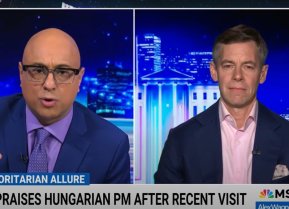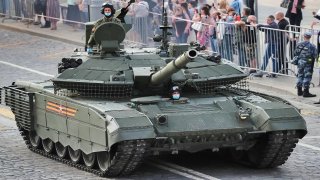Russia Has Much Bigger Dreams Than Conquering Ukraine
Today, all the West needs to do is let the Ukrainians do the fighting and dying. If Russia’s visions come to pass, it’ll be the Europeans and Americans who will fight and die.
Vladimir Putin’s attack dog, Dmitry Medvedev, may be unhinged, but he does the world a great service by shooting off at the mouth.
He reminds those in the West who believe that the Putin regime is rational and sane that the Putin regime is anything but. That’s important to keep in mind as the voices urging Ukraine to negotiate with Russia grow in volume. What exactly is there to talk about with a cross between Charles Manson and the Son of Sam? Wouldn’t it be more appropriate to institutionalize them first and put them on some serious meds?
Medvedev is also useful for reminding us that the idiocies he continually repeats are obviously not antithetical to Putin’s own views. Medvedev is not just a loose cannon who embarrasses the serious, long-bearded elder statesmen in the Kremlin. He says what they believe, but are reluctant to express as it would expose them as barbarians. So, when Medvedev threatens the West with nuclear war or insists that Ukraine must be wiped off the face of the earth, he’s just revealing the Kremlin’s secrets.
Medvedev has also managed to drive the final nail into the coffin of blaming NATO enlargement for Russia’s genocidal war against Ukraine. Although anybody with even a superficial knowledge of Russian and Ukrainian history knows that Putin was and is driven by imperial appetites and hatred of Ukraine, the politically surreal prospect of Ukraine’s joining NATO in 2045 continues to be viewed as so huge an immediate threat to Russia that Putin had no choice but to invade. Medvedev’s rants, and especially his most recent one, make it quite clear that NATO just isn’t on his mind.
Here are the key components of Medvedev’s “peace plan”:
-Capitulation: “Complete and unconditional surrender by the former ‘Ukraine’ as represented by the neo-Nazi clique in Kyiv.”
-De-democratization: “Recognition by the international community of the Nazi character of the former Kyiv political regime and the forcible denazification of all government bodies.” And “elections of the provisional parliament of the self-governing territory of former ‘Ukraine’.”
-Reparations: “Adoption by the provisional parliament of laws on the payment of all required compensation to Russia.”
-Self-destruction: “Official recognition by the interim parliament … that its entire territory is the territory of the Russian Federation. Adoption of an act of reunification of the territories of former ‘Ukraine’ with Russia.”
Not a word, or even a hint of a word, about neutrality or NATO. Instead, Medvedev—along with his comrades in the Kremlin—is absolutely clear what the end game entails: Ukraine’s absorption by Russia.
Will that make Russia stronger and more secure? Of course not. The Ukrainians will take to the underground, harass the Russians, and make their country ungovernable with anything less than a permanent occupation force of at least half a million men. NATO will mobilize, Russia’s neighbors will seek closer relations with the West, North Korea will express solidarity—and Russia will become weaker, less stable, and more insecure. Indeed, absorbing Ukraine could be the move that pushes the Russian Federation over the brink and into the abyss of collapse.
Does that make any kind of rational sense? Of course not. But that just goes to show that absorbing Ukraine is just as idiotic as attacking it. It only makes sense to people, such as Putin and Medvedev, who are driven by ideology, resentment, and delusions of grandeur.
A recently published letter by the President of the State Duma V. V. Volodin to Putin shows that the Kremlin has much grander plans than just swallowing Ukraine. The idea is to “de-Westernize” Russia by pursuing the following measures:
-“intensification of the étatization of the economy, whereby all the raw-materials branches become the property of the state”
-“sovereignization of science, culture and the arts, raising the role of the state in their development”
-“intensification of censorship, especially of TV and the Internet”
-“resolution of the question of opposition movements”
-“moderate clericalization of society within the bounds of possibility.”
So, Volodin proposes state ownership of much of the economy, state intervention in intellectual and cultural pursuits, state censorship, and state repression of opposition. And since the Russian Orthodox Church is a branch of the Russian state, clericalization simply translates into state control of religion and its supporters.
At the very least, this is a formula for totalitarian rule. At the most, it’s a recipe for transforming fascist Russia into a Nazi state.
If and when that transformation is completed—and it could be within the next half year, if Putin, Medvedev, and Volodin have anything to say about it—the challenges before the collective West will be infinitely greater than they are now. Today, all the West needs to do is let the Ukrainians do the fighting and dying. If the Kremlin’s visions come to pass, it’ll be the Europeans and Americans who will fight and die.
About the Author: Dr. Alexander Motyl
Alexander Motyl is a professor of political science at Rutgers-Newark. A specialist on Ukraine, Russia, and the USSR, and on nationalism, revolutions, empires, and theory, he is the author of 10 books of nonfiction, including Pidsumky imperii (2009); Puti imperii (2004); Imperial Ends: The Decay, Collapse, and Revival of Empires (2001); Revolutions, Nations, Empires: Conceptual Limits and Theoretical Possibilities (1999); Dilemmas of Independence: Ukraine after Totalitarianism (1993); and The Turn to the Right: The Ideological Origins and Development of Ukrainian Nationalism, 1919–1929 (1980); the editor of 15 volumes, including The Encyclopedia of Nationalism (2000) and The Holodomor Reader (2012); and a contributor of dozens of articles to academic and policy journals, newspaper op-ed pages, and magazines. He also has a weekly blog, “Ukraine’s Orange Blues.”
Image Credit: Creative Commons.


